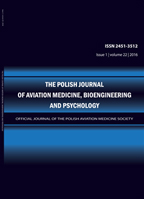2021, Volume 27, Issue 4
IMPACT OF CHEMICAL AGENTS THREATS ON INCREASED HEALTH RISK AMONG AIR FORCE MILITARY PERSONNEL
PAWEŁ RUSIN1, AGATA PABIN2, KRZYSZTOF KOWALCZUK3, STEFAN P. GAŹDZIŃSKI4, KATARZYNA KOMAR2, EWELINA MACULEWICZ2
-------------------------------------------------------------------------------------------------
1Institute of Biological Sciences, Cardinal Stefan Wyszynski University in Warsaw
2Department of Laboratory Diagnostics, Military Institute of Aviation Medicine
3Department of Simulator Studies and Aeromedical Training, Military Institute of Aviation Medicine
4Creative Neuroscience Lab – CNS Lab, Military Institute of Aviation Medicine
Autor korenspondencyjny: PAWEŁ RUSIN; Institute of Biological Sciences, Cardinal Stefan Wyszynski University in Warsaw; email: pawelrusin@gmail.com
Full text
Streszczenie
Abstract: The specific nature of the work of Air Force soldiers involves exposure to defined chemical agents (jet fuel, kerosene, hydrazine, grease and hydraulic oils, exhaust fumes, deicing agents). Long-term exposure to certain chemical agents, such as jet fuel, following occupational exposure can cause damage to the skin, lungs, cardiovascular system, neurodegenerative changes, as well as genetic changes which in result can activate mechanisms promoting uncontrolled cell proliferation leading in turn to carcinogenic changes. Due to the inhalative nature of exposure and the possibility of direct impact on the upper respiratory tract and lungs, petroleum-based mutagenic chemical agents are an important factor in promoting cancer development. These agents can produce changes in the stability of genetic material that increase the likelihood of small cell and non-small cell lung cancer, leukemias, prostate cancer, melanoma of the skin, squamous cell carcinomas of the head and neck, and many other cancers. Effects of jet fuels on DNA methylation level associated with the formation of heritable epigenetic changes have also been observed.
Słowa kluczowe
jet fuel; carcinogenic effect; military personnel; occupational exposure; military pilots
